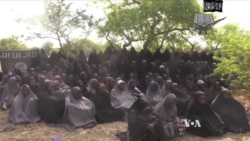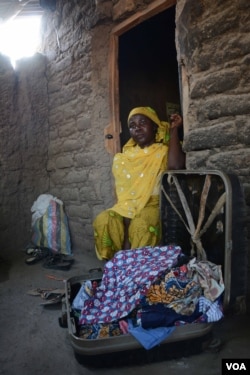It has been one year since Boko Haram took 276 teenage schoolgirls from their dormitory in the northeastern Nigerian town of Chibok.
The kidnapping of the Chibok girls struck a chord outside the northeast that five years of murderous insurgency there had not.
"Sometimes when you think about this, it is like you have an out-of-body experience. Are we alive? Children are alive going to school, and this happened to them? They disappeared," said Miriam Yakubu Ikunaiye, who helped organize a commemorative march Tuesday in Abuja. The Bring Back Our Girls movement has held daily rallies in Nigeria since just after the girls were taken.
School-age girls took part in Tuesday's march as “ambassadors” for the Chibok girls. The tone was that of resigned determination as the group chanted its now familiar refrain: “Bring back our girls. Now! And Alive!”
Later in the evening, marchers held a candlelight vigil in Abuja, accompanied by prayers and speeches by activists. Maryam Adamu said she had been to Unity Fountain hundreds of times to rally for the girls and had no plans to stop coming.
“We are coming here until the girls, we hear about them,” she said.
The Chibok kidnapping was an audacious, opportunistic but by no means isolated move by Boko Haram, a Nigerian extremist sect that has since joined forces with the Islamic State militant group.
The mass kidnapping was emblematic of a sharp uptick in militant attacks against civilians that have killed 5,500 people since the start of 2014, according to Amnesty International.
The Chibok girls were not the first or the last young women Boko Haram abducted.
“Over 2,000 women and girls have been abducted by Boko Haram since the beginning of 2014. They have been forced to either marry Boko Haram militants, provide services or clean. Some have even, according to what we have seen, been forced to train and take part in attacks on their own villages,” said Steve Cockburn, Amnesty’s deputy director for West and Central Africa.
But some activists believe Boko Haram is holding the Chibok girls separately in groups. The girls could be future bargaining chips or shields against airstrikes.
“The girls became very valuable to Boko Haram,” said Human Rights Watch Nigeria researcher Mausi Segun. “This is what I’ve heard from almost everyone that I’ve spoken with who had been in Boko Haram camps and managed to find their way out — that these girls are special, not everyone can approach where they are.”
“Boko Haram is continuing to guard them jealously,” she said, adding that militants maintain hideouts and zones of control despite having lost the major towns to an ongoing Nigerian and regional offensive.
Up in Chibok, the girls’ parents pray.
“People say the girls are in Gwoza. Others say they have been married off. The truth is only God knows where the girls are,” said Yana Galang, a mother of eight, including 17-year-old Rukatu, one of the abducted girls.
“My daughter, she is a very funny girl. Even when she saw me, if I am sad, she would come and kneel and stay with me. 'Mummy, what is worrying you? Don’t keep yourself so worried.' "
Time has marched on in Chibok. The month of April is mango season. The sweet smell of the ripe fruit is everywhere. Rukatu’s brother is getting married in a few weeks.
Boko Haram briefly seized control of the town in November. Many residents have since fled. Some of the girls' parents have died from the stress, say locals, or they were killed in Boko Haram attacks. It is a close-knit community. Everyone here is either related to, or knows, one of the abducted schoolgirls.
Bare bed frames still fill what’s left of the abandoned Secondary School for Girls. Soldiers guard the entrance. No soldiers were here a year ago when Boko Haram fighters forced their way through the gate and into the dormitories. Gunfire ripped through the night.
“The moment the men spoke in Hausa, saying they were soldiers and that we should not be afraid, we knew it was Boko Haram,” said 19-year-old student Saratu. “They told us we should not be in school. That education, 'boko,' is bad, 'haram,' and that we should come with them.”
The men forced some girls onto vehicles, while others had to walk. The men looted the storage rooms and set the school ablaze before they left.
Saratu is one of 57 girls who escaped. She hurt her leg jumping from a vehicle as they approached the Sambisa Forest, Boko Haram’s prime hideout. A man from the village found her and carried her home.
Two hundred nineteen girls are still missing.
One girl's father, Lawan Zanna, said President Goodluck Jonathan told parents to be “patient,” he said, that “sooner or later” their daughters would come home.
President-elect Muhammadu Buhari has pledged to do things “differently,” but offers no false hope.
“We do not know if the Chibok girls can be rescued. Their whereabouts remain unknown,” Buhari said in a statement. “As much as I wish to, I cannot promise that we can find them. But I say to every parent, family member and friend of the children that my government will do everything in its power to bring them home.”
Schools in the northeast were closed last year because of Boko Haram threats. The girls were only back to take final exams.
“The last day I was with her, she said, 'Daddy what will you promise me when I complete my school?' I promised a lot for her, that 'if you come out with good colors, if your results are good, I will take you to university,' ” Zanna said.
His voice cracked as he talked about his daughter, Aisha. She had just turned 18 when she was taken, he said. It is now her 19th birthday.







